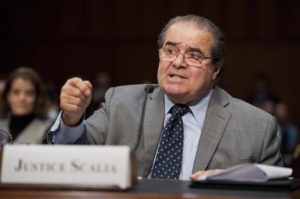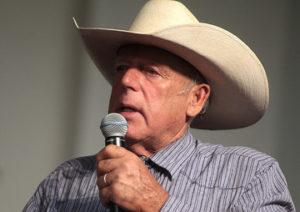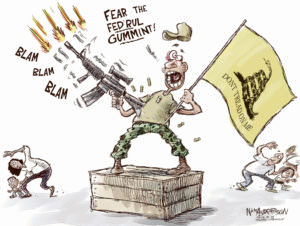Another Defeat for the Feds Over Cliven Bundy’s Use of Public Land
A mistrial is declared in a case involving the states' rights figure, his sons and a militia leader. The nation was riveted in 2014 by the armed standoffs they helped instigate.LAS VEGAS — A U.S. judge in Nevada dealt another defeat Wednesday to federal prosecutors trying to punish leaders of armed standoffs meant to oppose federal authority over vast swaths of land in the American West.
Chief U.S. District Judge Gloria Navarro in Las Vegas declared a mistrial in the long-awaited case against states’ rights figure Cliven Bundy, his sons Ryan and Ammon Bundy and self-styled Montana militia leader Ryan Payne.
Prosecutors were trying to prove the four broke the law in a tense armed confrontation between Bundy supporters and government agents who gave up efforts to confiscate Bundy cattle in 2014.
Navarro didn’t dismiss the case outright, but said she might after a Jan. 8 hearing. She also severely criticized prosecutors for suppressing information and violating constitutional due process by failing to turn over all their evidence to defense attorneys. She called the conduct “willful.”
“The defense has a right to information so it can go to a jury,” the judge said, “so the jury can decide.”
The setback comes a year after a federal jury in Portland, Oregon, acquitted Ryan and Ammon Bundy of all charges after leading an occupation of a U.S. wildlife refuge in eastern Oregon in early 2016 and demanding the federal government turn over public land to local control.
This year, prosecutors in Nevada failed to gain full convictions in two trials against six defendants in the Bundy case who acknowledged carrying assault-style weapons during the April 2014 confrontation outside Bunkerville, 80 miles northeast of Las Vegas.
Two of them, from Idaho, were memorably photographed on a highway overpass pointing weapons at heavily armed federal agents facing hundreds of flag-waving protesters in a dry riverbed below.
The display forced a smaller group of agents to quit rounding up Bundy cattle and sent a shock wave across Western states, where the federal government owns most of the land and many ranchers chafe at grazing restrictions.
Cliven Bundy, 71, has become a states’ rights icon. Hundreds answered calls on social media to protest and protect him.
His trial on 15 felony charges, including conspiracy, weapon counts and threatening and impeding a federal officer, had been expected to last four months. The defendants face the prospect of decades in prison.
“Awesome. But not yet complete,” Ryan Bundy said outside the courtroom where he had asked the judge to remove house arrest restrictions for him, his brother and Payne. Navarro said she’d decide that question later.
“I believe there is no jury in this country that will convict us,” Ammon Bundy said. “We have something most powerful, and that’s the truth.”
Cliven Bundy remained in federal detention in protest, although his lawyer was seeking his release. Payne declined to comment.
Acting U.S. Attorney Steven Myhre didn’t immediately say whether he would retry the case.
Navarro spent 30 minutes in a packed courtroom citing evidence of misconduct by Myhre and his team.
The judge recalled prosecutors describing efforts to obtain records a “fantastic fishing expedition,” ”urban legend” and a “shiny object to distract the court” as they denied the existence of video and log book evidence of a sweeping government operation covering a vast range half the size of Delaware.
Agents also set up corrals for protesters well away from the activity and designated them “free speech zones.”
Navarro said she was dismayed to learn some 3,300 pages of previously undisclosed FBI and Bureau of Land Management records were turned over to defense attorneys since Oct. 10. The deadline had been Oct. 1 ahead of the trial that opened in mid-November.
Some contained references to snipers and surveillance cameras on hilltops around the Bundy ranch, which prosecutors had insisted did not exist.
The judge called it impossible for defense teams to have fully prepared for the trial. She also offered some stunning disclosures.
Despite written reports predicting the Bundys would not resort to violence, Navarro said government officials mounted a “Bundy media campaign.”
Government news releases later asserted that Bundy cattle were being rounded up because he failed to pay more than $1.1 million grazing fees and penalties.
One threat assessment said the Bundys “will probably get in your face, but not into a shootout,” the judge said.
Another report undercut a key claim by environmentalists and the government that Bundy cattle grazing in what is now Gold Butte National Monument caused any documented injury to tortoises.
The judge made no mention of a whistleblower memo by a former Bureau of Land Management investigator in the case that was made public last week.
It alleged widespread bad judgment, bias and misconduct during the planning and operation of the cattle roundup, as well as “likely policy, ethical and legal violations among senior and supervisory staff.”
Your support matters…Independent journalism is under threat and overshadowed by heavily funded mainstream media.
You can help level the playing field. Become a member.
Your tax-deductible contribution keeps us digging beneath the headlines to give you thought-provoking, investigative reporting and analysis that unearths what's really happening- without compromise.
Give today to support our courageous, independent journalists.





You need to be a supporter to comment.
There are currently no responses to this article.
Be the first to respond.